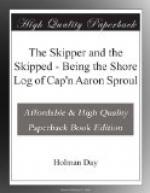“Oh, thunder!” he ejaculated. “While we’re about it, we might as well see it through. My curiosity is sort of stirred up.”
The Cap’n was angry in good earnest again.
“Curiosity!” he snarled. “Now you’ve named it. I wouldn’t own up to bein’ such a pickid-nosed old maid as that, not for a thousand dollars!”
Hiram was wholly unruffled.
“How do you suppose any one ever knew enough to write a cyclopedy,” said he, “if they didn’t go investigate and find out? They went official, just as we are goin’ now.”
Hiram seemed to take much content in that phase of the situation, feeling that mere personal inquisitiveness was dignified in this case under the aegis of law and authority. It was exactly this view of the matter that most disturbed Cap’n Aaron Sproul, for that hateful Pharisee, Squire Reeves, had supplied the law to compel his own authority as selectman.
He sat with elbows on his knees, gloomily surveying a dim reflection of himself in the dasher of Hiram’s wagon. In pondering on the trammels of responsibility the sour thought occurred to him, as it had many times in the past year, that commanding a town was a different proposition from being ruler of the Jefferson P. Benn on the high seas—with the odds in favor of the __Benn__.
XVIII
The Cap’n had never visited that retired part of the town called “Purgatory.” He found Mr. Gammon’s homestead to be a gray and unkempt farm-house from which the weather had scrubbed the paint. The front yard was bare of every vestige of grass and contained a clutter that seemed to embrace everything namable, including a gravestone.
“What be ye gettin’ ready for—an auction?” growled the Cap’n, groutily, his seaman’s sense of tidiness offended. “Who do you expect will bid in a second-hand gravestone?”
“It ain’t second-hand,” replied the owner, reprovingly, as he eased himself out of the wagon. “Mis’ Gammon, my first wife, is buried there. ’Twas by her request. She made her own layin’-out clothes, picked her bearers and music, and selected the casket. She was a capable woman.”
“It’s most a wonder to me that he ever took the crape off’m the door-knob,” remarked Hiram, in a husky aside to the Cap’n, not intending to be overheard and somewhat crestfallen to find that he had been.
“I didn’t for some time, till it got faded,” explained Mr. Gammon, without display of resentment. “I had the casket-plate mounted on black velvet and framed. It’s in the settin’-room. I’ll show it to you before you leave.”
Hiram pulled his mouth to one side and hissed under shelter of his big mustache: “Well, just what a witch would want of that feller, unless ’twas to make cracked ice of him, blame me if I know!”
Mr. Gammon began apprehensive survey of his domains.
“Let’s go home,” muttered the Cap’n, his one idea of retreat still with him. “What do you and I know about witches, anyway, even if there are such things? We’ve done our duty! We’ve been here. If he gets us to investigatin’ it will be just like him to want us to dig that woman up.”




